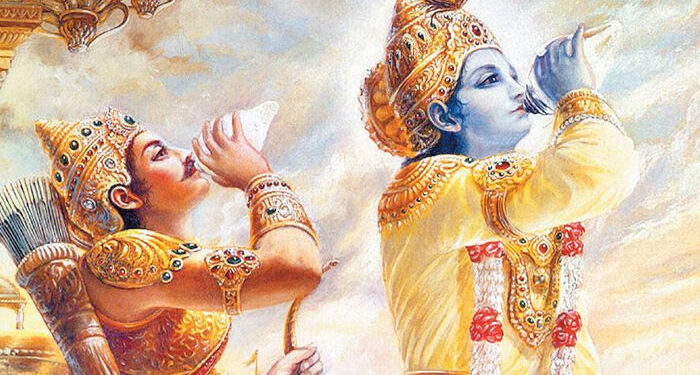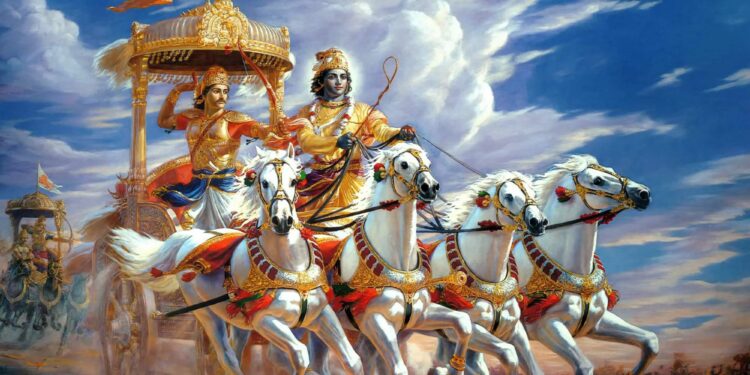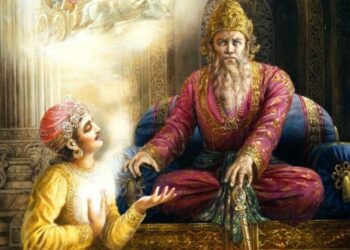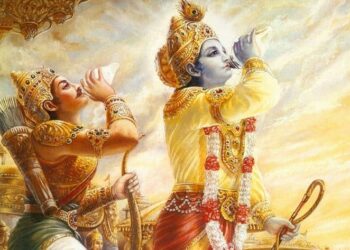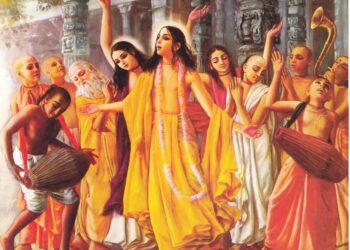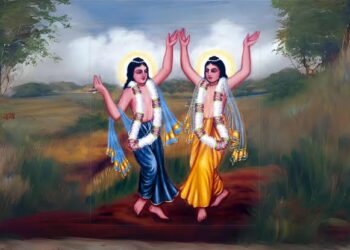TEXT 6
etad-yonīni bhūtāni
sarvāṇīty upadhāraya
ahaṁ kṛtsnasya jagataḥ
prabhavaḥ pralayas tathā
SYNONYMS
etat—these two natures; yonīni—whose source of birth; bhūtāni—everything created; sarvāṇi—all; iti—thus; upadhāraya—know; aham—I; kṛtsnasya—all-inclusive; jagataḥ—of the world; prabhavaḥ—the source of manifestation; pralayaḥ—annihilation; tathā—as well as.
TRANSLATION
All created beings have their source in these two natures. Of all that is material and all that is spiritual in this world, know for certain that I am both the origin and the dissolution.
PURPORT
Everything that exists is a product of matter and spirit. Spirit is the basic field of creation, and matter is created by spirit. Spirit is not created at a certain stage of material development. Rather, this material world is manifested only on the basis of spiritual energy. This material body is developed because spirit is present within matter; a child grows gradually to boyhood and then to manhood because that superior energy, spirit soul, is present. Similarly, the entire cosmic manifestation of the gigantic universe is developed because of the presence of the Supersoul, Viṣṇu. Therefore spirit and matter, which combine to manifest this gigantic universal form, are originally two energies of the Lord, and consequently the Lord is the original cause of everything. A fragmental part and parcel of the Lord, namely the living entity, may be the cause of a big skyscraper, a big factory, or even a big city, but he cannot be the cause of a big universe. The cause of the big universe is the big soul, or the Supersoul. And Kṛṣṇa, the Supreme, is the cause of both the big and small souls. Therefore He is the original cause of all causes. This is confirmed in the Kaṭha Upaniṣad (2.2.13). Nityo nityānāṁ cetanaś cetanānām.
TEXT 7
mattaḥ parataraṁ nānyat
kiñcid asti dhanañjaya
mayi sarvam idaṁ protaṁ
sūtre maṇi-gaṇā iva
SYNONYMS
mattaḥ—beyond Me; para-taram—superior; na—not; anyat kiñcit—anything else; asti—there is; dhanañjaya—O conqueror of wealth; mayi—in Me; sarvam—all that be; idam—which we see; protam—is strung; sūtre—on a thread; maṇi—gaṇāḥ—pearls; iva—like.
TRANSLATION
O conqueror of wealth, there is no truth superior to Me. Everything rests upon Me, as pearls are strung on a thread.
PURPORT
There is a common controversy over whether the Supreme Absolute Truth is personal or impersonal. As far as Bhagavad-gītā is concerned, the Absolute Truth is the Personality of Godhead, Śrī Kṛṣṇa, and this is confirmed in every step. In this verse, in particular, it is stressed that the Absolute Truth is a person. That the Personality of Godhead is the Supreme Absolute Truth is also the affirmation of the Brahma-saṁhitā: īśvaraḥ paramaḥ kṛṣṇaḥ sac-cid-ānanda-vigrahaḥ; that is, the Supreme Absolute Truth Personality of Godhead is Lord Kṛṣṇa, who is the primeval Lord, the reservoir of all pleasure, Govinda, and the eternal form of complete bliss and knowledge. These authorities leave no doubt that the Absolute Truth is the Supreme Person, the cause of all causes. The impersonalist, however, argues on the strength of the Vedic version given in the Śvetāśvatara Upaniṣad (3.10): tato yad uttarataraṁ tad arūpam anāmayam/ ya etad vidur amṛtās te bhavanti athetare duḥkham evāpiyanti. “In the material world Brahmā, the primeval living entity within the universe, is understood to be the supreme amongst the demigods, human beings and lower animals. But beyond Brahmā there is the Transcendence, who has no material form and is free from all material contaminations. Anyone who can know Him also becomes transcendental, but those who do not know Him suffer the miseries of the material world.”
The impersonalist puts more stress on the word arūpam. But this arūpam is not impersonal. It indicates the transcendental form of eternity, bliss and knowledge as described in the Brahma-saṁhitā quoted above. Other verses in the Śvetāśvatara Upaniṣad (3.8-9) substantiate this as follows:
vedāham etaṁ puruṣaṁ mahāntam
āditya-varṇaṁ tamasaḥ parastāt
tam eva viditvāti mṛtyum eti
nānyaḥ panthā vidyate ‘yanāya
yasmāt paraṁ nāparam asti kiñcid
yasmān nāṇīyo no jyāyo ‘sti kiñcit
vṛkṣa iva stabdho divi tiṣṭhaty ekas
tenedaṁ pūrṇaṁ puruṣeṇa sarvam
“I know that Supreme Personality of Godhead who is transcendental to all material conceptions of darkness. Only he who knows Him can transcend the bonds of birth and death. There is no way for liberation other than this knowledge of that Supreme Person.
“There is no truth superior to that Supreme Person, because He is the supermost. He is smaller than the smallest, and He is greater than the greatest. He is situated as a silent tree, and He illumines the transcendental sky, and as a tree spreads its roots, He spreads His extensive energies.”
From these verses one concludes that the Supreme Absolute Truth is the Supreme Personality of Godhead, who is all-pervading by His multi-energies, both material and spiritual.


